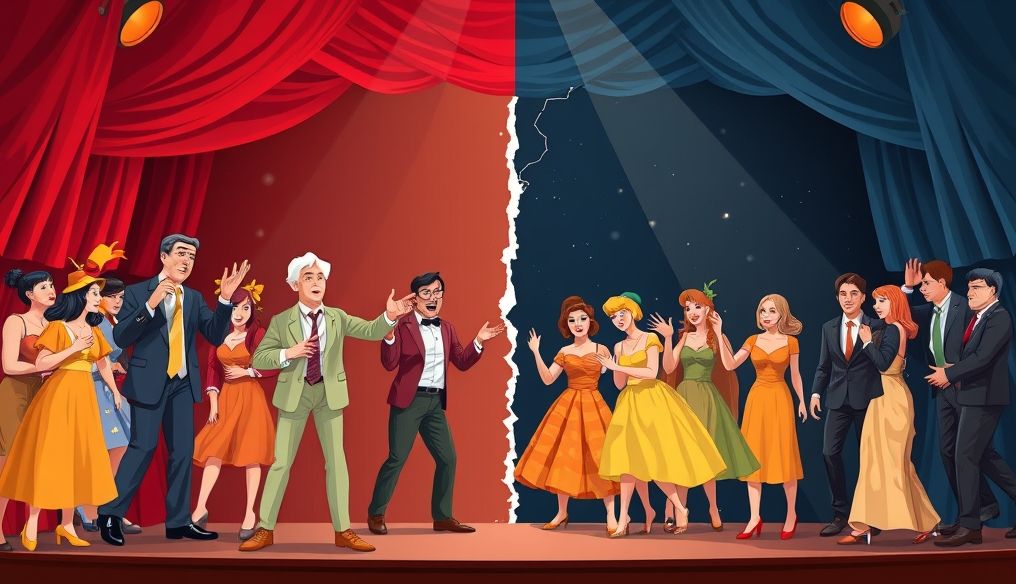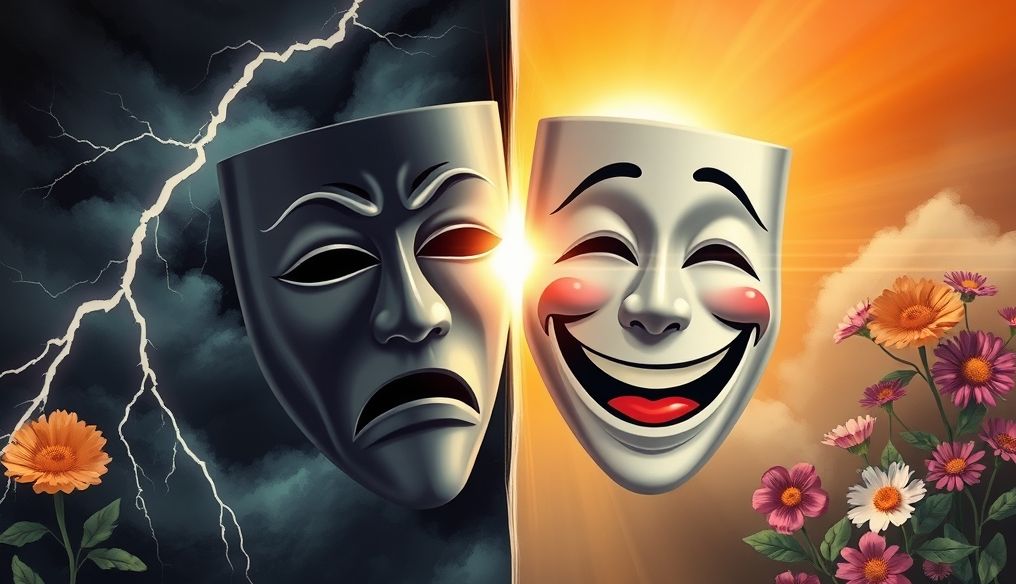What are the different types of plays: Comedy, Tragedy, and More?
Theatre is the art of performance that combines acting, dialogue, music, and design to create a unique experience for the audience. Throughout the ages, different types of plays have evolved, each characterized by its own properties and goals. Among these types, comedy and tragedy stand out as the most famous and influential.
1. Tragedy: A Tragedy of Inevitable Fate
Tragedy is a type of play that deals with serious and tragic events that usually lead to the death or severe suffering of the main character. The main character in a tragedy is often a noble or high-ranking figure who faces an internal or external conflict that leads to their downfall.
1.1. Basic Elements of Tragedy:
- The Tragic Hero: A noble character who suffers from a flaw or error (Hamartia) that leads them to their inevitable fate.
- Conflict: An internal conflict (between the hero's desires and principles) or external conflict (with external forces such as fate or society).
- Catharsis: A feeling of pity and fear that grips the audience when watching the hero's suffering, leading to their purification from negative emotions.
- Inevitable Fate: The belief that events are predestined and cannot be changed.
1.2. Examples of Famous Tragedies:
- Oedipus Rex (Sophocles): The story of King Oedipus who tries to escape a terrible prophecy, but eventually discovers that he killed his father and married his mother.
- Hamlet (Shakespeare): The story of Prince Hamlet who seeks revenge for his father's murder.
- Romeo and Juliet (Shakespeare): A tragic love story between two young people from feuding families.
2. Comedy: Laughter as a Remedy for the Soul
Comedy is a type of play that aims to make the audience laugh through funny situations, verbal ironies, and bizarre characters. Comedy often depicts everyday life in an exaggerated or satirical way, aiming to highlight the flaws of society or human behavior.
2.1. Basic Elements of Comedy:
- Funny Situations: Unexpected or embarrassing situations that evoke laughter.
- Verbal Ironies: Using words in a clever or satirical way to create a comedic effect.
- Comedic Characters: Eccentric or exaggerated characters that evoke laughter.
- Happy Ending: Comedy often ends with a happy ending in which problems are resolved and harmony is achieved.
2.2. Types of Comedy:
- Farce: Relies on funny and exaggerated situations and comedic physical movements.
- Romantic Comedy: Focuses on romantic relationships between characters, and features happy endings.
- Black Comedy: Deals with serious or tragic topics in a satirical or funny way.
- Social Comedy: Highlights the flaws of society or human behavior in a satirical way.
2.3. Examples of Famous Comedies:
- Twelfth Night (Shakespeare): A romantic comedy revolving around love and mistaken identity.
- The Importance of Being Earnest (Oscar Wilde): A satirical social comedy that criticizes Victorian society.
- Waiting for Godot (Samuel Beckett): An absurd black comedy depicting two characters waiting for an unknown person.
3. Other Types of Plays:
In addition to comedy and tragedy, there are other types of plays that deserve attention:
3.1. Drama: A Reflection of Reality
Drama is a type of play that deals with serious and impactful events in everyday life. Drama often depicts human relationships, social conflicts, and ethical issues.
3.2. Melodrama: Arouse Emotions
Melodrama is a type of play that aims to arouse strong emotions in the audience through exciting events, stereotypical characters, and impactful soundtracks.
3.3. Musical Theatre: A Blend of Art and Entertainment
Musical theatre is a type of play that combines acting, singing, dancing, and music to create an integrated entertainment experience.
3.4. Experimental Theatre: Pushing Boundaries
Experimental theatre is a type of play that aims to challenge theatrical traditions and explore new forms of artistic expression.
4. The Importance of Understanding Play Types:
Understanding the different types of plays helps us to:
- Appreciate Theatrical Art: By understanding the characteristics of each type, we can appreciate the artistic and creative aspects of different plays.
- Choose the Right Plays: We can choose the plays that suit our tastes and interests.
- Analyze Plays More Deeply: We can analyze plays and understand their messages and themes better.
- Develop Playwriting Skills: Playwrights can use their knowledge of different types of plays to create innovative and impactful works of art.
5. Theatre: A Mirror Reflecting Society
Theatre, in all its forms, is not just a means of entertainment, but also a mirror reflecting society, its issues, and its concerns. Through plays, we can understand ourselves and the world around us better, and we can also contribute to changing society for the better.
Conclusion:
Understanding the different types of plays, from comedy and tragedy to drama and musical theatre, is essential to appreciating this ancient art. Each type offers us a unique perspective on life and society, and contributes to enriching our cultural experience.




